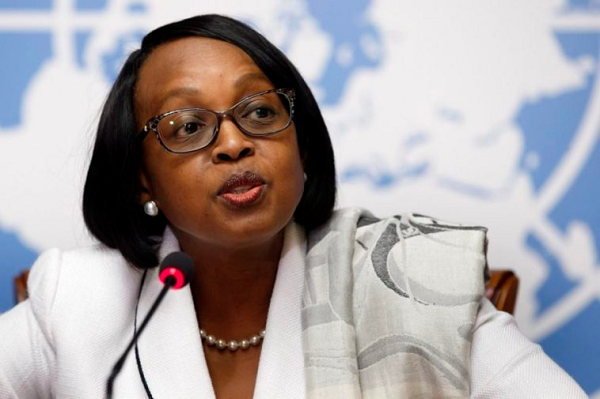
COVID-19 cases rise - Deaths in Africa increase over 40%
COVID-19 cases in Ghana have recorded a consistent rise over the past four weeks since the discovery of the Delta variant in communities.
The Ghana Health Service (GHS) in its latest report said there had been a gradual increase in active cases over the past four weeks as the country has recorded over 2,512 active cases with an average daily case count of over 120.
Advertisement
As of July 11, 2021, total cases recorded in the country since the disease was recorded in March 2020, is 98,114 out of which 806 deaths have occurred.
The Greater Accra Region leads the active cases with 1,284, followed by the Ashanti Region with 771. The Eastern Region is next with 51 cases.
Interestingly, regions without any active cases such as the North East and Savannah, now have two and six cases respectively.
The Upper East and Upper West regions still keep a clean slate with zero active cases.
Africa worsens
This rise is consistent with an Africa-wide surge of the deadly and contagious viral infection.
The World Health Organisation (WHO) estimates that Africa recorded a 43 per cent week-on-week rise in COVID-19 deaths, as hospital admissions have increased rapidly and countries face shortages in oxygen and intensive care beds.
According to the WHO, COVID-19 cases had risen for eight straight weeks, topping six million on July 13, 2021.
Over the past month, it said Africa recorded an additional one million cases and the world health body says “this is the shortest time it’s taken so far to add one million cases.”
Comparatively, the situation took around three months to move from four million to five million cases.
“This COVID-19 surge is the fastest the continent has seen,” the WHO said.
Fatalities
Fatalities in Africa have also increased to 6,273 in the week ending on July 11, 2021 from 4,384 deaths in the previous week.
“Deaths have climbed steeply for the past five weeks. This is a clear warning sign that hospitals in the most impacted countries are reaching a breaking point,” the World Health Organisation’s (WHO’s) Regional Director for Africa, Dr Matshidiso Moeti, said during a virtual weekly media briefing last Thursday.
“Under-resourced health systems in countries are facing dire shortages of the health workers, supplies, equipment and infrastructure needed to provide care to severely ill COVID-19 patients,” she said.
Namibia, South Africa, Tunisia, Uganda and Zambia together account for 83 per cent of the new deaths recorded in the past week.
Fatigue
The WHO said Africa was now less than one per cent shy of the weekly peak reached in January when 6,294 deaths occurred.
It said the continent’s case fatality rate, which is the proportion of deaths among confirmed cases, currently stood at 2.6 per cent against the global average of 2.2 per cent.
Dr Moeti added that the surge was driven by public fatigue with key health measures and an increased spread of variants.
To date, the Delta variant, currently the most transmissible of all variants, has been detected in 21 African countries, while the Alpha variant is in 35 countries with Beta in 30, the WHO said.
It said hospital admissions in about 10 countries had increased rapidly with at least six countries facing shortages of intensive care unit beds.
Demand for medical oxygen had spiked and now estimated to be 50 per cent higher than at the same time in 2020, yet supply had not kept up, the WHO stated.
“The number one priority for African countries is boosting oxygen production to give critically ill patients a fighting chance,” Dr Moeti said.
“Effective treatment is the last line of defence against COVID-19 and it must not crumble,” she added.
The WHO identifies insufficient quantity, disrepair or poor maintenance of production plants as well as challenges in distribution, scarcity of cylinders, personnel or technical skills as some of the barriers to adequate medical oxygen supply in Africa.
Its rapid assessment of six countries facing a resurgence found that just 27 per cent of the medical oxygen needed is produced.
“The double barrier of vaccine scarcity and treatment challenges is seriously undermining effective response to the surging pandemic,” Dr Moeti said.
Vaccines
The rise in cases comes amid inadequate vaccine supplies. The continent has vaccinated 52 million people since the start of the vaccine rollout in March this year, accounting for just 1.6 per cent of the 3.5 billion people vaccinated worldwide.
Only 18 million people in Africa are fully vaccinated, representing 1.5 per cent of the continent’s population compared with over 50 per cent in some high-income countries.
However, Dr Moeti said, with the expected fresh vaccine shipments and strong preventive measures, “we can still turn the tide against the virus.”
About 190 million extra COVID-19 vaccine doses will be needed to fully vaccinate 10 per cent of Africa’s population by September 2021, with around 750 million more doses needed to fully vaccinate 30 per cent by the end of 2021.
WHO interventions
The world health body said it was working with countries to improve COVID-19 treatment and critical care capacities by providing guidance on clinical management and support to update protocols and train health workers.
Along with partners, the organisation was also delivering essential medical supplies, such as oxygen cylinders and had supported the manufacture and repair of oxygen production plants, Dr Moeti stated.
The virtual press conference facilitated by APO Group was also joined by the Minister of Public Health, Hygiene and Prevention of the Democratic Republic of the Congo, Dr Jean-Jacques Mbungani Mbanda, and a Physician Specialist at the Ministry of Health and Social Services, Namibia, Dr Ishmael Katjitae, and others.
Writer’s [email protected]



